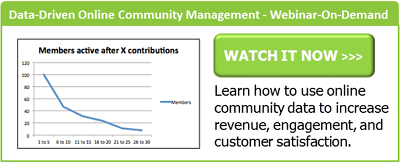
It takes a village to keep a customer happy.
Branded customer communities rarely form organically, nor can the operation and success a strategy as central as a private online community ride on the shoulders of one individual. It takes a village of staff members.
When a business uses an online customer community to increase the value of doing business with the company and manage customer relationships, there are many roles that have to be filled to maintain the level of support, engagement, and benefit that your customers and executives expect.
According to a study by Altimeter, there are a variety of skills that are needed to make up an effective online community management team. The most critical include writing skills, daily customer relations, ability to work with other departments, and collecting product feedback for the company.
We work with some companies that have an entire team of people who handle these roles from multiple departments. Others have only a single community manager charged with a majority of the responsibilities.
Some organizations dedicate people to certain aspects of managing and growing their private customer or member community, while other organizations divide up community management roles among current employees by add to the workloads of those who already have full time responsibilities.
How to Approach Building an Online Community Management Team
Managing an online customer community can be unclear if you’re used to traditional one-on-one customer relationship management. Try not to start your online community strategy by just covering the basic roles, like content creation and moderation, then adding tasks as you get to know your community. Your company and community will progress more quickly by understanding all the key community management roles from the beginning.
Do your best to fill these roles right from the beginning, whether with one person or several. If you can’t cover all the roles for your customer community initially, you can prioritize, reduce, and plan to meet these needs over time as needed.
The Many Roles that Employees Play in Successful Online Communities
Here are 12 of the major roles that someone needs to be responsible for when managing your online customer community:
Role #1 Publisher
The publisher is responsible for the useful, helpful content that is produced for the customer community. That means coordinating, editing (repurposing), and distributing the exclusive content that has been created specifically for your community’s target audiences.
Role #2 City Planner
Online communities require careful planning. The ‘city planner’ community management role needs to be able to identify and modify processes that will improve the customer experience and performance of your online customer community.
Role #3 Chief of Staff
This is the person who takes charge and gets the job done. They assure management that things are running as they should be and run any challenges up the flagpole when needed.
Role #4 Quarterback
In the day-to-day operations of your online community, the quarterback is the one who is responsible for calling out a play and handing the ball off to other people in the company or the community so they can carry it out. This community management role needs the authority, title, and charisma to be able to bring others together in order to carry out a successful plan of action.
Role #5 First Responder
Whenever a problem arises concerning the online community, it is vital to have someone who fills the role of the first responder – the first on the screen. If community members have issues or concerns, the first responder is the one that will come in and address those problems as quickly as possible – either publicly to the community or private to individual members. Often times, this is the role of the customer support team rather than that of a community manager.
Role #6 Capitalist
The capitalist has a deep understanding of the business strategy of the community and vested interest in the company’s overall performance. In this role, you conduct research and collect community data in order to make sure that the customer community is still aligned with the company’s goals.
Role #7 Data Geek
In organizations that sustain success over time, data drives everything. The same is true of your online customer community. Data gives you info about your members’ problems, your strengths, and your weakness. In this role, you use online community metrics to tell the story of what is going on in the community and what needs to happen to improve the community’s health.
Role #8 Fortune Teller
There is no denying that we all want to have someone close by who can predict the future. Where will our market be a year from now? What will happen if we keep doing X? If you’re wearing the ‘fortune teller’ community management hat, you will use collected community data to make market-based predictions and use that information to help the senior management team make important decisions about market strategies, product direction, and messages.
Role #9 Town Crier
It is important to have someone who is responsible for spreading the word around the community. They keep members engaged and in-the-know, as well as pass along information about upcoming opportunities that customers can take advantage of, such as training, customer events, or new resources.
Role #10 Reporter
Reporters are great at digging up information. Having a community manager that can use their strong relationships with the community to hunt down positive stories about members of the community is important. Sharing these stories is what keeps the members coming back to the community and connected to each, as well as the company.
Role #11 Recruiter
Whether you are a Fortune 500 company or a nonprofit association, volunteer leadership from your customers or members plays a large part in your online community’s lifecycle. The person playing the ‘recruiter’ community management role devotes time to seeking out leaders and volunteers among the community members in order to engage them in larger roles and enlist them in the content creation process.
Role #12 Teacher
The teacher role is important because they are responsible for training other staff members and customer leaders on how to get the most out of the community. The teacher will break down procedures and demonstrate actions so that others can learn what to do quickly and easily. The ‘teacher’ community management role is also responsible for updating training and support materials when the community changes (i.e. new discussions, new features, new customer segments, etc.).
Online Customer Community Takeaway
No matter how your company chooses to fill these roles, either with a single community manager or a team of them working together, all of these things need to be done in order to make the community a success.
We’ve found that consolidating the roles into fewer people can be beneficial since the skills applied to one area can be used in others to a greater advantage. The knowledge that is gained in one role can also be beneficial when applied to another role. However, this approach comes with risks if your core group of online community managers is prone to switching jobs.
Above all, the point it to make sure you have these roles covered. If you can’t, make sure you understand how leaving a gap in your community management plan may impact your online customer community.
Lego image by Joe Shlabotnik
